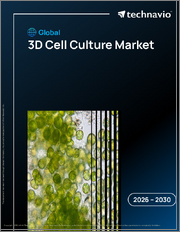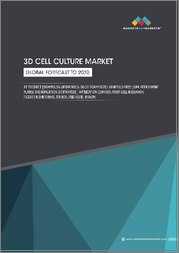
|
시장보고서
상품코드
1640803
3D 세포배양 시장 : 세계 산업 분석, 시장 규모, 점유율, 성장 및 동향, 향후 예측(2025-2032년)3D Cell Cultures Market: Global Industry Analysis, Size, Share, Growth, Trends, and Forecast, 2025 - 2032 |
||||||
Persistence Market Research는 최근 세계 3D 세포배양 시장에 대한 종합적인 조사 보고서를 발표하여 주요 시장 역학에 대한 상세한 분석과 함께 원동력, 새로운 동향, 기회, 과제 등 주요 시장 역학에 대한 심층적인 분석을 제공했습니다. 이 보고서는 시장 상황에 대한 귀중한 통찰력을 제공하여 이해관계자들이 정보에 입각한 의사결정을 내리고 성장 기회를 활용할 수 있도록 돕습니다.
주요 인사이트
- 3D 세포배양 시장 규모(2025년) : 18억 달러
- 시장 규모 예측(금액 기준, 2032년) : 34억 달러
- 세계 시장 성장률(CAGR, 2025-2032년) : 9.5%
3D 세포배양 시장 : 분석 범위
3D 세포배양 시장은 생체 내 환경을 시뮬레이션하고 세포의 거동과 상호작용을 보다 정확하게 모델링할 수 있는 첨단 세포배양 기술에 초점을 맞추었습니다. 이러한 배양은 신약개발, 암 연구, 재생의료, 줄기세포 기술 적용에 필수적입니다. 생명공학 기술의 발전, 시장 개척을 위한 예측 모델에 대한 수요 증가, 학술 및 산업 연구 환경에서 3D 세포배양 기술의 채택 증가 등이 시장을 주도하고 있습니다.
시장 성장 촉진요인:
세계 3D 세포배양 시장의 성장을 가속하는 몇 가지 요인이 있습니다. 신약 개발 및 암 연구에서 보다 생리적 관련성이 높은 세포 모델에 대한 요구가 증가하면서 1차 연구에 대한 수요가 증가하고 있습니다. 바이오 의약품 연구에 대한 투자 증가와 조직공학 및 재생의료의 발전이 수요를 촉진하고 있습니다. 개인 맞춤형 의료로의 전환과 줄기세포 기술의 활용 확대도 시장 확대에 기여하고 있습니다. 또한, 3D 세포배양은 동물실험에 대한 의존도를 낮출 수 있어 제약 및 생명공학 분야에서 그 매력이 커지고 있습니다.
시장 성장 억제요인 :
이 시장은 3D 세포배양 시스템의 높은 비용과 기존 2D 배양에 비해 사용 방법이 복잡하다는 문제에 직면해 있습니다. 프로토콜과 방법의 표준화가 제한적이기 때문에 보급에 걸림돌이 될 수 있습니다. 또한, 대규모 용도의 확장성 및 재현성과 관련된 기술적 문제도 성장의 걸림돌로 작용하고 있습니다. 이러한 문제를 해결하기 위해서는 추가적인 기술 발전과 업계 이해관계자들 간의 협력이 필요합니다.
시장 기회 :
3D 세포배양 시장은 특히 의약품 개발 및 정밀의료 분야에서 큰 비즈니스 기회를 제공합니다. 스캐폴드 기반 및 스캐폴드 프리 기술 개발과 하이드로겔 기반 시스템 개발로 새로운 성장의 길이 열리고 있습니다. 신흥 시장 진출과 재생의료 및 줄기세포 치료 분야의 연구 활동의 활성화는 시장 관계자들에게 더 많은 비즈니스 기회를 제공합니다. 연구기관 및 바이오제약 기업과의 전략적 제휴 및 협력 관계는 이러한 기회를 활용하고 혁신을 촉진하는 데 도움이 될 수 있습니다.
본 보고서에서 답변을 얻을 수 있는 주요 질문
- 세계 3D 세포배양 시장의 성장을 가속하는 주요 요인은?
- 3D 세포배양 기술 도입이 가장 활발하게 진행되고 있는 응용 분야는?
- 스캐폴드 기반 및 스캐폴드 프리 기술의 발전은 경쟁 구도에 어떤 영향을 미치고 있는가?
- 3D 세포배양 시장의 주요 업체는 어디인가? 그리고 시장 지위를 유지하기 위해 어떤 전략을 취하고 있는가?
- 세계 3D 세포배양 시장의 새로운 트렌드와 전망은?
목차
제1장 주요 요약
제2장 시장 개요
- 시장 범위와 정의
- 시장 역학
- 성장 촉진요인
- 성장 억제요인
- 기회
- 과제
- 주요 동향
- 거시경제 요인
- 세계의 부문별 전망
- 세계의 GDP 성장 전망
- 세계의 의료비 전망
- COVID-19의 영향 분석
- 예측 요인 : 관련성과 영향
제3장 부가가치 분석
- 약물 채택 분석
- 밸류체인 분석
- 최종사용자/마켓플레이스 리스트
- 소매
- E-Commerce
- 최종사용자(업계) 리스트
- 최종사용자/마켓플레이스 리스트
- 주요 거래와 합병
- PESTLE 분석
- Porter의 Five Forces 분석
제4장 세계의 3D 세포배양 시장 전망 : 과거(2019-2023년)와 예측(2025-2032년)
- 주요 하이라이트
- 시장 규모와 전년대비 성장률(금액 기준(10억 달러))
- 절대적 매출 기회
- 시장 규모 분석과 예측(금액 기준(10억 달러))
- 과거 시장 규모 분석(금액 기준(10억 달러), 2019-2023년)
- 현재 시장 규모 분석과 예측(금액 기준(10억 달러), 2025-2032년)
- 세계의 3D 세포배양 시장 전망 : 제품별
- 서론/주요 조사 결과
- 과거 시장 규모 분석 : 제품별(금액 기준(10억 달러), 2019-2023년)
- 현재 시장 규모 분석과 예측 : 제품별(금액 기준(10억 달러), 2025-2032년)
- 스캐폴드 프리 3D 세포배양
- 스캐폴드 기반 3D 세포배양
- 하이드로겔 기반 3D 세포배양
- 고분자 하드 매트리얼 기반 3D 세포배양
- 시장 매력 분석 : 제품별
- 세계의 3D 세포배양 시장 전망 : 용도별
- 서론/주요 조사 결과
- 과거 시장 규모 분석 : 용도별(금액 기준(10억 달러), 2019-2023년)
- 현재 시장 규모 분석과 예측 : 용도별(금액 기준(10억 달러), 2025-2032년)
- Drug Discovery
- 조직 재생 및 재생의료
- 암 연구
- 줄기세포 기술
- 기타
- 시장 매력 분석 : 용도별
- 세계의 3D 세포배양 시장 전망 : 최종사용자별
- 서론/주요 조사 결과
- 과거 시장 규모 분석 : 최종사용자별(금액 기준(10억 달러), 2019-2023년)
- 현재 시장 규모 분석과 예측 : 최종사용자별(금액 기준(10억 달러), 2025-2032년)
- 바이오테크놀러지·제약 산업
- 학술연구기관
- 병원 검사실
- CRO(의약품 임상시험수탁기관)
- 시장 매력 분석 : 최종사용자별
제5장 세계의 3D 세포배양 시장 전망 : 지역별
- 주요 하이라이트
- 과거 시장 규모 분석 : 지역별(금액(10억 달러) 기반, 2019-2023년)
- 현재 시장 규모 분석과 예측 : 지역별(금액(10억 달러) 기반, 2025-2032년)
- 북미
- 유럽
- 동아시아
- 남아시아 및 오세아니아
- 라틴아메리카
- 중동 및 아프리카
- 시장 매력 분석 : 지역별
제6장 북미의 3D 세포배양 시장 전망 : 과거(2019-2023년)와 예측(2025-2032년)
제7장 유럽의 3D 세포배양 시장 전망 : 과거(2019-2023년)와 예측(2025-2032년)
제8장 동아시아의 3D 세포배양 시장 전망 : 과거(2019-2023년)와 예측(2025-2032년)
제9장 남아시아 및 오세아니아의 3D 세포배양 시장 전망 : 과거(2019-2023년)와 예측(2025-2032년)
제10장 라틴아메리카의 3D 세포배양 시장 전망 : 과거(2019-2023년)와 예측(2025-2032년)
제11장 중동 및 아프리카의 3D 세포배양 시장 전망 : 과거(2019-2023년)와 예측(2025-2032년)
제11장 경쟁 구도
- 시장 점유율 분석(2023년)
- 시장 구조
- 경쟁 강도 매핑 : 시장별
- 경쟁 대시보드
- 기업 개요(상세 : 개요, 재무, 전략, 최근 동향)
- Merck KGaA(Sigma-Aldrich Corporation)
- Thermo Fisher Scientific, Inc.
- Corning Incorporated.
- Becton, Dickinson and Company
- 3D Biotek LLC
- Lonza Group
- InSphero AG
- Synthecon, Inc
- Nanofiber Solutions, Inc.
- Greiner Group A
- REPROCELL
제13장 부록
- 분석 방법
- 분석 전제조건
- 두자어 및 약어
Persistence Market Research has recently released a comprehensive report on the global 3D Cell Cultures Market, providing an in-depth analysis of key market dynamics, including driving forces, emerging trends, opportunities, and challenges. This report offers valuable insights into the market landscape, enabling stakeholders to make informed decisions and capitalize on growth opportunities.
Key Insights:
- 3D Cell Cultures Market Size (2025E): USD 1.8 Bn
- Projected Market Value (2032F): USD 3.4 Bn
- Global Market Growth Rate (CAGR 2025 to 2032): 9.5%
3D Cell Cultures Market - Report Scope:
The 3D Cell Cultures market focuses on advanced cell culture techniques that simulate the in vivo environment, allowing for more accurate modeling of cellular behavior and interactions. These cultures are crucial for applications in drug discovery, cancer research, regenerative medicine, and stem cell technology. The market is driven by advancements in biotechnology, the growing demand for predictive models in drug development, and the increasing adoption of 3D cell culture techniques across academic and industrial research settings.
Market Growth Drivers:
Several factors are driving the growth of the global 3D Cell Cultures market. The growing need for more physiologically relevant cell models in drug discovery and cancer research is a primary driver. Rising investments in biopharmaceutical research, coupled with advancements in tissue engineering and regenerative medicine, are fueling demand. The shift toward personalized medicine and the increasing use of stem cell technologies are also contributing to market expansion. Additionally, the ability of 3D cell cultures to reduce reliance on animal testing enhances their appeal in the pharmaceutical and biotechnology sectors.
Market Restraints:
The market faces challenges such as the high cost of 3D cell culture systems and the complexity associated with their usage compared to traditional 2D cultures. Limited standardization in protocols and methods can hinder widespread adoption. Additionally, technical challenges related to scalability and reproducibility in large-scale applications pose barriers to growth. Addressing these issues requires further technological advancements and collaborative efforts among stakeholders in the industry.
Market Opportunities:
The 3D Cell Cultures market presents significant opportunities, particularly in the areas of drug development and precision medicine. Advancements in scaffold-based and scaffold-free technologies, as well as the development of hydrogel-based systems, are creating new growth avenues. Expansion into emerging markets and increasing research activities in regenerative medicine and stem cell therapy provide further opportunities for market players. Strategic partnerships and collaborations with research institutions and biopharmaceutical companies can help leverage these opportunities and drive innovation.
Key Questions Answered in the Report:
- What are the main factors driving global growth in the 3D Cell Cultures market?
- Which application areas are witnessing the highest adoption of 3D cell culture techniques?
- How are advancements in scaffold-based and scaffold-free technologies impacting the competitive landscape?
- Who are the leading players in the 3D Cell Cultures market, and what strategies are they employing to maintain their market position?
- What are the emerging trends and future prospects in the global 3D Cell Cultures market?
Competitive Intelligence and Business Strategy:
Key players in the global 3D Cell Cultures market, such as Merck KGaA, Thermo Fisher Scientific, Inc., and Corning Incorporated, are investing heavily in research and development to enhance their product offerings. These companies focus on innovation, strategic collaborations, and partnerships with research organizations and academic institutions to strengthen their market presence. Expanding distribution networks, developing cost-effective solutions, and emphasizing the scalability of 3D cell culture systems are some of the key strategies employed by market leaders to gain a competitive edge.
Key Companies Profiled:
- Merck KGaA (Sigma-Aldrich Corporation)
- Thermo Fisher Scientific, Inc.
- Corning Incorporated
- Becton, Dickinson and Company
- 3D Biotek LLC
- Lonza Group
- InSphero AG
- Synthecon, Inc.
- Nanofiber Solutions, Inc.
- Greiner Group A
- REPROCELL
- Others
3D Cell Cultures Market Segmentation:
By Product:
- Scaffold-Free 3D Cell Culture
- Scaffold-Based 3D Cell Culture
- Hydrogel-Based 3D Cell Culture
- Polymeric Hard Material-Based 3D Cell Culture
By Application:
- Drug Discovery
- Tissue Regeneration and Regenerative Medicines
- Cancer Research
- Stem Cell Technology
- Others
By End User:
- Biotechnology and Pharmaceuticals Industries
- Academic Research Institutes
- Hospital Laboratories
- Contract Research Organizations
By Region:
- North America
- Europe
- East Asia
- South Asia and Oceania
- Latin America
- Middle East and Africa
Table of Contents
1. Executive Summary
- 1.1. Global 3D Cell Cultures Market Snapshot, 2025 - 2032
- 1.2. Market Opportunity Assessment, 2025 - 2032, US$ Bn
- 1.3. Key Market Trends
- 1.4. Future Market Projections
- 1.5. Premium Market Insights
- 1.6. Industry Developments and Key Market Events
- 1.7. PMR Analysis and Recommendations
2. Market Overviews
- 2.1. Market Scope and Definition
- 2.2. Market Dynamics
- 2.2.1. Drivers
- 2.2.2. Restraints
- 2.2.3. Opportunity
- 2.2.4. Challenges
- 2.2.5. Key Trends
- 2.3. Macro-Economic Factors
- 2.3.1. Global Sectorial Outlook
- 2.3.2. Global GDP Growth Outlook
- 2.3.3. Global Healthcare Spending Outlook
- 2.4. COVID-19 Impact Analysis
- 2.5. Forecast Factors - Relevance and Impact
3. Value Added Insights
- 3.1. Drug Adoption Analysis
- 3.2. Value Chain Analysis
- 3.2.1. List of End-user/Marketplaces
- 3.2.1.1. Retail
- 3.2.1.2. E-Commerce
- 3.2.2. List of End User (Industry)
- 3.2.1. List of End-user/Marketplaces
- 3.3. Key Deals and Mergers
- 3.4. PESTLE Analysis
- 3.5. Porter's Five Force Analysis
4. Global 3D Cell Cultures Market Outlook: Historical (2019 - 2023) and Forecast (2025 - 2032)
- 4.1. Key Highlights
- 4.1.1. Market Size (US$ Bn) and Y-o-Y Growth
- 4.1.2. Absolute $ Opportunity
- 4.2. Market Size (US$ Bn) Analysis and Forecast
- 4.2.1. Historical Market Size (US$ Bn) Analysis, 2019 - 2023
- 4.2.2. Current Market Size (US$ Bn) Analysis and Forecast, 2025 - 2032
- 4.3. Global 3D Cell Cultures Market Outlook: Product
- 4.3.1. Introduction / Key Findings
- 4.3.2. Historical Market Size (US$ Bn) Analysis, By Product, 2019 - 2023
- 4.3.3. Current Market Size (US$ Bn) Analysis and Forecast, By Product, 2025 - 2032
- 4.3.3.1. Scaffold Free 3D Cell Culture
- 4.3.3.2. Scaffold-based 3D Cell Culture
- 4.3.3.2.1. Hydrogel-based 3D Cell Culture
- 4.3.3.2.2. Polymeric Hard Material-based 3D Cell Culture
- 4.3.4. Market Attractiveness Analysis: Product
- 4.4. Global 3D Cell Cultures Market Outlook: Application
- 4.4.1. Introduction / Key Findings
- 4.4.2. Historical Market Size (US$ Bn) Analysis, By Application, 2019 - 2023
- 4.4.3. Current Market Size (US$ Bn) Analysis and Forecast, By Application, 2025 - 2032
- 4.4.3.1. Drug Discovery
- 4.4.3.2. Tissue Regeneration & Regenerative Medicines
- 4.4.3.3. Cancer Research
- 4.4.3.4. Stem Cell Technology
- 4.4.3.5. Others
- 4.4.4. Market Attractiveness Analysis: Application
- 4.5. Global 3D Cell Cultures Market Outlook: End User
- 4.5.1. Introduction / Key Findings
- 4.5.2. Historical Market Size (US$ Bn) Analysis, By End User, 2019 - 2023
- 4.5.3. Current Market Size (US$ Bn) Analysis and Forecast, By End User, 2025 - 2032
- 4.5.3.1. Biotechnology and Pharmaceuticals Industries
- 4.5.3.2. Academic Research Institutes
- 4.5.3.3. Hospital Laboratories
- 4.5.3.4. Contract Research Organization
- 4.5.4. Market Attractiveness Analysis: End User
5. Global 3D Cell Cultures Market Outlook: Region
- 5.1. Key Highlights
- 5.2. Historical Market Size (US$ Bn) Analysis, By Region, 2019 - 2023
- 5.3. Current Market Size (US$ Bn) Analysis and Forecast, By Region, 2025 - 2032
- 5.3.1. North America
- 5.3.2. Europe
- 5.3.3. East Asia
- 5.3.4. South Asia and Oceania
- 5.3.5. Latin America
- 5.3.6. Middle East & Africa
- 5.4. Market Attractiveness Analysis: Region
6. North America 3D Cell Cultures Market Outlook: Historical (2019 - 2023) and Forecast (2025 - 2032)
- 6.1. Key Highlights
- 6.2. Historical Market Size (US$ Bn) Analysis, By Market, 2019 - 2023
- 6.2.1. By Country
- 6.2.2. By Product
- 6.2.3. By Application
- 6.2.4. By End User
- 6.3. Current Market Size (US$ Bn) Analysis and Forecast, By Country, 2025 - 2032
- 6.3.1. U.S.
- 6.3.2. Canada
- 6.4. Current Market Size (US$ Bn) Analysis and Forecast, By Product, 2025 - 2032
- 6.4.1. Scaffold Free 3D Cell Culture
- 6.4.2. Scaffold Based 3D Cell Culture
- 6.4.2.1. Hydrogel based 3D cell culture
- 6.4.2.2. Polymeric Hard Material Based 3D cell Culture
- 6.5. Current Market Size (US$ Bn) Analysis and Forecast, By Application, 2025 - 2032
- 6.5.1. Drug Discovery
- 6.5.2. Tissue Regeneration & Regenerative Medicines
- 6.5.3. Cancer Research
- 6.5.4. Stem Cell Technology
- 6.5.5. Others
- 6.6. Current Market Size (US$ Bn) Analysis and Forecast, By End User, 2025 - 2032
- 6.6.1. Biotechnology and Pharmaceuticals Industries
- 6.6.2. Academic Research Institutes
- 6.6.3. Hospital Laboratories
- 6.6.4. Contract Research Organization
- 6.7. Market Attractiveness Analysis
7. Europe 3D Cell Cultures Market Outlook: Historical (2019 - 2023) and Forecast (2025 - 2032)
- 7.1. Key Highlights
- 7.2. Historical Market Size (US$ Bn) Analysis, By Market, 2019 - 2023
- 7.2.1. By Country
- 7.2.2. By Product
- 7.2.3. By Application
- 7.2.4. By End User
- 7.3. Current Market Size (US$ Bn) Analysis and Forecast, By Country, 2025 - 2032
- 7.3.1. Germany
- 7.3.2. France
- 7.3.3. U.K.
- 7.3.4. Italy
- 7.3.5. Spain
- 7.3.6. Russia
- 7.3.7. Turkey
- 7.3.8. Rest of Europe
- 7.4. Current Market Size (US$ Bn) Analysis and Forecast, By Product, 2025 - 2032
- 7.4.1. Scaffold Free 3D Cell Culture
- 7.4.2. Scaffold Based 3D Cell Culture
- 7.4.2.1. Hydrogel based 3D cell culture
- 7.4.2.2. Polymeric Hard Material Based 3D cell Culture
- 7.5. Current Market Size (US$ Bn) Analysis and Forecast, By Application, 2025 - 2032
- 7.5.1. Drug Discovery
- 7.5.2. Tissue Regeneration & Regenerative Medicines
- 7.5.3. Cancer Research
- 7.5.4. Stem Cell Technology
- 7.5.5. Others
- 7.6. Current Market Size (US$ Bn) Analysis and Forecast, By End User, 2025 - 2032
- 7.6.1. Biotechnology and Pharmaceuticals Industries
- 7.6.2. Academic Research Institutes
- 7.6.3. Hospital Laboratories
- 7.6.4. Contract Research Organization
- 7.7. Market Attractiveness Analysis
8. East Asia 3D Cell Cultures Market Outlook: Historical (2019 - 2023) and Forecast (2025 - 2032)
- 8.1. Key Highlights
- 8.2. Historical Market Size (US$ Bn) Analysis, By Market, 2019 - 2023
- 8.2.1. By Country
- 8.2.2. By Product
- 8.2.3. By Application
- 8.2.4. By End User
- 8.3. Current Market Size (US$ Bn) Analysis and Forecast, By Country, 2025 - 2032
- 8.3.1. China
- 8.3.2. Japan
- 8.3.3. South Korea
- 8.4. Current Market Size (US$ Bn) Analysis and Forecast, By Product, 2025 - 2032
- 8.4.1. Scaffold Free 3D Cell Culture
- 8.4.2. Scaffold Based 3D Cell Culture
- 8.4.2.1. Hydrogel based 3D cell culture
- 8.4.2.2. Polymeric Hard Material Based 3D cell Culture
- 8.5. Current Market Size (US$ Bn) Analysis and Forecast, By Application, 2025 - 2032
- 8.5.1. Drug Discovery
- 8.5.2. Tissue Regeneration & Regenerative Medicines
- 8.5.3. Cancer Research
- 8.5.4. Stem Cell Technology
- 8.5.5. Others
- 8.6. Current Market Size (US$ Bn) Analysis and Forecast, By End User, 2025 - 2032
- 8.6.1. Biotechnology and Pharmaceuticals Industries
- 8.6.2. Academic Research Institutes
- 8.6.3. Hospital Laboratories
- 8.6.4. Contract Research Organization
- 8.7. Market Attractiveness Analysis
9. South Asia and Oceania 3D Cell Cultures Market Outlook: Historical (2019 - 2023) and Forecast (2025 - 2032)
- 9.1. Key Highlights
- 9.2. Historical Market Size (US$ Bn) Analysis, By Market, 2019 - 2023
- 9.2.1. By Country
- 9.2.2. By Product
- 9.2.3. By Application
- 9.2.4. By End User
- 9.3. Current Market Size (US$ Bn) Analysis and Forecast, By Country, 2025 - 2032
- 9.3.1. India
- 9.3.2. Southeast Asia
- 9.3.3. ANZ
- 9.3.4. Rest of South Asia & Oceania
- 9.4. Current Market Size (US$ Bn) Analysis and Forecast, By Product, 2025 - 2032
- 9.4.1. Scaffold Free 3D Cell Culture
- 9.4.2. Scaffold Based 3D Cell Culture
- 9.4.2.1. Hydrogel based 3D cell culture
- 9.4.2.2. Polymeric Hard Material Based 3D cell Culture
- 9.5. Current Market Size (US$ Bn) Analysis and Forecast, By Application, 2025 - 2032
- 9.5.1. Drug Discovery
- 9.5.2. Tissue Regeneration & Regenerative Medicines
- 9.5.3. Cancer Research
- 9.5.4. Stem Cell Technology
- 9.5.5. Others
- 9.6. Current Market Size (US$ Bn) Analysis and Forecast, By End User, 2025 - 2032
- 9.6.1. Biotechnology and Pharmaceuticals Industries
- 9.6.2. Academic Research Institutes
- 9.6.3. Hospital Laboratories
- 9.6.4. Contract Research Organization
- 9.7. Market Attractiveness Analysis
10. Latin America 3D Cell Cultures Market Outlook: Historical (2019 - 2023) and Forecast (2025 - 2032)
- 10.1. Key Highlights
- 10.2. Historical Market Size (US$ Bn) Analysis, By Market, 2019 - 2023
- 10.2.1. By Country
- 10.2.2. By Product
- 10.2.3. By Application
- 10.2.4. By End User
- 10.3. Current Market Size (US$ Bn) Analysis and Forecast, By Country, 2025 - 2032
- 10.3.1. Brazil
- 10.3.2. Mexico
- 10.3.3. Rest of Latin America
- 10.4. Current Market Size (US$ Bn) Analysis and Forecast, By Product, 2025 - 2032
- 10.4.1. Scaffold Free 3D Cell Culture
- 10.4.2. Scaffold Based 3D Cell Culture
- 10.4.2.1. Hydrogel based 3D cell culture
- 10.4.2.2. Polymeric Hard Material Based 3D cell Culture
- 10.5. Current Market Size (US$ Bn) Analysis and Forecast, By Application, 2025 - 2032
- 10.5.1. Drug Discovery
- 10.5.2. Tissue Regeneration & Regenerative Medicines
- 10.5.3. Cancer Research
- 10.5.4. Stem Cell Technology
- 10.5.5. Others
- 10.6. Current Market Size (US$ Bn) Analysis and Forecast, By End User, 2025 - 2032
- 10.6.1. Biotechnology and Pharmaceuticals Industries
- 10.6.2. Academic Research Institutes
- 10.6.3. Hospital Laboratories
- 10.6.4. Contract Research Organization
- 10.7. Market Attractiveness Analysis
11. Middle East & Africa 3D Cell Cultures Market Outlook: Historical (2019 - 2023) and Forecast (2025 - 2032)
- 11.1. Key Highlights
- 11.2. Historical Market Size (US$ Bn) Analysis, By Market, 2019 - 2023
- 11.2.1. By Country
- 11.2.2. By Product
- 11.2.3. By Application
- 11.2.4. By End User
- 11.3. Current Market Size (US$ Bn) Analysis and Forecast, By Country, 2025 - 2032
- 11.3.1. GCC Countries
- 11.3.2. Egypt
- 11.3.3. South Africa
- 11.3.4. Northern Africa
- 11.3.5. Rest of Middle East & Africa
- 11.4. Current Market Size (US$ Bn) Analysis and Forecast, By Product, 2025 - 2032
- 11.4.1. Scaffold Free 3D Cell Culture
- 11.4.2. Scaffold Based 3D Cell Culture
- 11.4.2.1. Hydrogel based 3D cell culture
- 11.4.2.2. Polymeric Hard Material Based 3D cell Culture
- 11.5. Current Market Size (US$ Bn) Analysis and Forecast, By Application, 2025 - 2032
- 11.5.1. Drug Discovery
- 11.5.2. Tissue Regeneration & Regenerative Medicines
- 11.5.3. Cancer Research
- 11.5.4. Stem Cell Technology
- 11.5.5. Others
- 11.6. Current Market Size (US$ Bn) Analysis and Forecast, By End User, 2025 - 2032
- 11.6.1. Biotechnology and Pharmaceuticals Industries
- 11.6.2. Academic Research Institutes
- 11.6.3. Hospital Laboratories
- 11.6.4. Contract Research Organization
- 11.7. Market Attractiveness Analysis
12. Competition Landscape
- 12.1. Market Share Analysis, 2023
- 12.2. Market Structure
- 12.2.1. Competition Intensity Mapping By Market
- 12.2.2. Competition Dashboard
- 12.3. Company Profiles (Details - Overview, Financials, Strategy, Recent Developments)
- 12.3.1. Merck KGaA (Sigma-Aldrich Corporation)
- 12.3.1.1. Overview
- 12.3.1.2. Segments and Products
- 12.3.1.3. Key Financials
- 12.3.1.4. Market Developments
- 12.3.1.5. Market Strategy
- 12.3.2. Thermo Fisher Scientific, Inc.
- 12.3.3. Corning Incorporated.
- 12.3.4. Becton, Dickinson and Company
- 12.3.5. 3D Biotek LLC
- 12.3.6. Lonza Group
- 12.3.7. InSphero AG
- 12.3.8. Synthecon, Inc
- 12.3.9. Nanofiber Solutions, Inc.
- 12.3.10. Greiner Group A
- 12.3.11. REPROCELL
- 12.3.1. Merck KGaA (Sigma-Aldrich Corporation)
13. Appendix
- 13.1. Research Methodology
- 13.2. Research Assumptions
- 13.3. Acronyms and Abbreviations



















